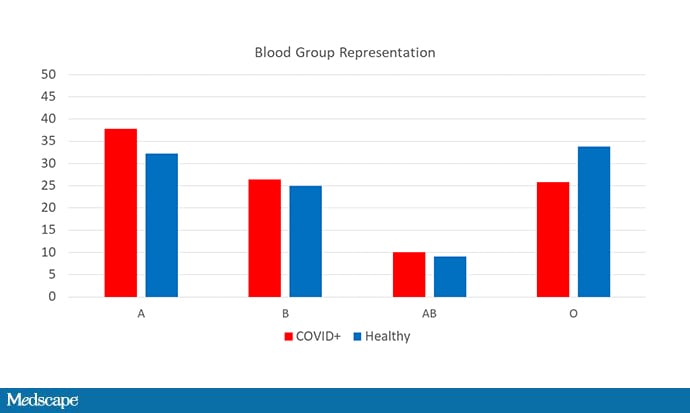One of the things that has really bothered me about COVID-19 is the dramatic variability in presentation, from being asymptomatic to having sniffles, complete respiratory failure requiring ECMO, and, of course, death. I've seen all of these firsthand at this point. And sure, we know that there are risk factors for bad outcomes, such as older age and comorbidities. But ask any of us who have cared for these patients and we'll tell you that there is clearly other stuff going on. I've seen a 35-year-old man with no comorbidities fighting for his life on ECMO.
It seems logical that genetics may play a role here, but those studies are just in the early phases. Nevertheless, some tantalizing clues are emerging—and some from really unlikely places.
Okay. A couple of months ago, my family did tests to figure out our blood type. We did this for no scientific or medical reason; we were bored, stuck at home, wanted some fun science-y stuff to do with the kids, and found some cheap kits on Amazon.
I am type O. My wife, type A.
And that was that. Until I started seeing that blood type may be associated with the risk for coronavirus infection and death from COVID-19.
This supposition immediately raised red flags for me. Correlating blood type with various outcomes has long straddled the border between regular science and pseudoscience—and often had a racially tinged flavor. I am pretty sure blood type does not correlate with various personality traits, for example. So why would blood type dictate susceptibility to a respiratory virus?
But, since I am often wrong and love to find out when I'm wrong, I looked into it. And I honestly think there may be something here.
Caveats: Data are really limited, and studies are sort of trickling out in preprint form and in various esoteric journals. But I'll point out a couple that hold water for me.
The first, a preprint out of China, looked at just over 2000 COVID-positive individuals and reported that there was a higher infection rate in people with type A blood.
What you see here is that there was a higher-than-expected rate of individuals with blood group A diagnosed with COVID-19 than in the general population.

Conversely, fewer-than-expected individuals with blood group O appeared in the pool of those infected. Similar results were seen when the analysis was restricted to the 206 individuals who died from COVID-19. Again, blood group A was overrepresented.
Medscape © 2020 WebMD, LLC
Any views expressed above are the author's own and do not necessarily reflect the views of WebMD or Medscape.
Cite this: Is COVID-19 Risk Linked to Blood Type? - Medscape - Jun 16, 2020.


